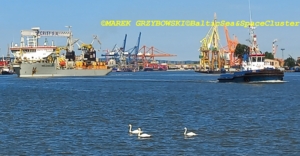30% of ports are not ready to run “Maritime Single Window 2024”. Polish ports will have PCS from mid-2023

 By Marek Grzybowski
By Marek Grzybowski
Almost one third of ports around the world are unprepared to implement the IMO recommendation to introduce customer IT services in the form of “Maritime Single Window 2024” – according to a study of 200 ports by New Kale.
The introduction of the obligation to use MSW [Maritime Single Window] from January 1, 2024 is not only “a significant step towards accelerating digitalization in maritime trade”, but also “an opportunity for all interested parties operating in maritime shipping and a necessary step forward” – opening the symposium “Maritime Single Window 2024 – A window of opportunities” at the IMO headquarters in London, IMO Secretary General Kitack Lim said.
One Window in each port
The IMO President also said that the introduction of MSW by ports and ship operators will accelerate the achievement of aspirations for the digitization and decarbonization of international shipping. He praised the progress made by the shipping and port industry in recent years and declared IMO’s support for Member States in finding concrete solutions to the upcoming new obligations under the FAL Convention.
In his opening remarks, IAPH President Subramaniam Karuppiah warned that the Covid-19 pandemic has highlighted that maritime transport is seriously lagging behind in its transition to digitalization.
Nikolaus Schües, president-designate of BIMCO, emphasized that the Ministry of Interior should be treated as “an opportunity that must be seized and that we cannot miss.”
One third of ports without a “window”
A study of 200 ports conducted by Kale Logistics Solutions showed that the situation is not very optimistic. As many as 30% of ports are unable to implement the solutions recommended by IMO regulations regarding electronic data exchange. It has been estimated that IT in ports and the introduction of a “single window” in serving port customers may contribute to global savings of USD 50 billion.
Announcing the results of the diagnostic survey, Kale highlighted the urgent need for the maritime transport industry to accelerate its digital transformation. High implementation costs, long deadlines and varying levels of digital readiness were mentioned as the main factors hindering the introduction of ICT solutions in ports.
The study included ports located in the Asia-Pacific region, the Middle East, Europe, Africa, North America and South America. It was emphasized that port community systems embedded in the MSW are integral to realizing the true potential of the port.
– The aim of this study was to identify the tangible benefits that the maritime industry can achieve with the support of digital technologies, and the results showed potential savings of up to USD 50 billion per year by using MSW platforms – said Vineet Malhotra, co-founder and director of Kale Logistics Solutions.
Port Single Window for 12 agencies
In his opinion, “However, these benefits depend on 100% implementation of the Ministry of Internal Affairs, and our report shows that ports encounter a number of barriers hindering digitalization.”
– The MSW concept has the potential to revolutionize the international shipping industry – emphasizes Malhotra.
MSW platforms deliver significant sustainability benefits by digitizing documentation, streamlining processes and improving information exchange, resulting in reduced paper consumption and more efficient ship management, ultimately lowering emissions and environmental impact.
With an average of 12 agencies collaborating on a single onshore operation, the Home Office is simplifying documentation procedures between all parties involved and ensuring that information only needs to be entered once.
The MSW Kale platform is compliant with IMO standards and enables the electronic transfer of information and documentation between maritime and port stakeholders, which will become a mandatory requirement in early 2024.
“The importance of this study will sow the seeds of a digital revolution in the maritime industry around the world, showing how digitalization can not only bring order to the industry’s current chaotic operations, but also achieve significant sustainability goals in the long run,” Malhotra added.
The report was released by Shyam Jagannathan, Director General, Shipping, Ministry of Ports, Shipping and Waterways, Government of India, at the India World Maritime Summit in Mumbai, India.
IMO and the World Bank will finance port “windows”
During the IMO seminar, Periklis Saragiotis from the World Bank and consultant Kate Munn worked with Fiji to implement MSW.
World Bank experts supported the implementation of a “pre-analysis”, which involves assessing readiness for implementation before making any adjustments or simplifications to systems, thus avoiding the digitization of inefficient procedures.
– Fiji is a good example of cooperation between the World Bank and IMO with a member state, Saragiotis said.
“If we work together, coordinate and try to send a message to the customer and the government that we are here to help… that’s a very strong message,” Saragiotis says.
Norway and Singapore support and provide know-how
Antigua and Barbuda received in-kind technical support from Norway in the form of specialist knowledge for the implementation of the MSW. They have opted for a system specifically designed for Small Island Developing States (SIDS) that can be modified and adapted as needed.
Wayne Mykoo, representing the Department of Maritime Services and Merchant Shipping of Antigua and Barbuda, said the project highlighted IMO’s ability to support members in meeting their obligations.
Another IMO initiative is the Single Window for Facilitation of Trade (SWiFT) project. Under his auspices, Singapore and Angola are implementing a pilot project to establish a maritime single window platform developed for medium-sized ports based on the system successfully implemented in Antigua and Barbuda.
Gavin Yeo from the Maritime and Port Authority of Singapore summarized what they need to do: The project is currently developing prototypes for the Angola team, from which the team will provide feedback so that improvements can be made to the construction process.


Polish PCS is up to date
Port of Gdynia Authority S.A. from July 17, 2023, the Ministry of Internal Affairs launched and informs port customers that “in order to complete formalities related to reporting the entry/exit of a ship to/from the Port of Gdynia, it introduces the obligation to use the PCS brokerage module (PCS-MM)”. At the Port of Gdansk, the PCS (Port Community System) brokerage module has been in force since August 16, 2023.
“This is an innovative solution that automates the processes of preparing formalities related to reporting the entry or departure of a ship to a port,” emphasizes ZMP Gdańsk.
“The new system will be used by maritime offices, customs and tax administration, port administration, veterinary inspection, maritime terminals, ports, logistics companies, customs agencies, shipowners and forwarding companies. PCS is an open and neutral platform integrating existing systems and facilitating data exchange,” informs the Szczecin-Świnoujście Seaports Authority.
It is emphasized that this is a product that was created in Poland, constructed by Polish IT specialists, and the shareholders of Polish PCS are Polish companies. The company was established by the ports in Szczecin and Świnoujście, Gdańsk and Gdynia.
Polish PCS emphasizes that the task of the system “is to optimize the control of transport processes by collecting, combining and processing information on transport and everything related to logistics in one place.”
“The use of the PCS brokerage module enables safe and intelligent exchange of information in the field of logistics and ship and goods handling, in accordance with the “Programme for the development of Polish seaports until 2030″ adopted by the Council of Ministers and the priority indicated in this document – digitization of Polish seaports,” he emphasizes ZMP Gdynia.
Polish ports have therefore prepared to implement the IMO recommendations regarding “Single Window” for six months while they are valid. Using PCS-MM is possible after creating an access account.
